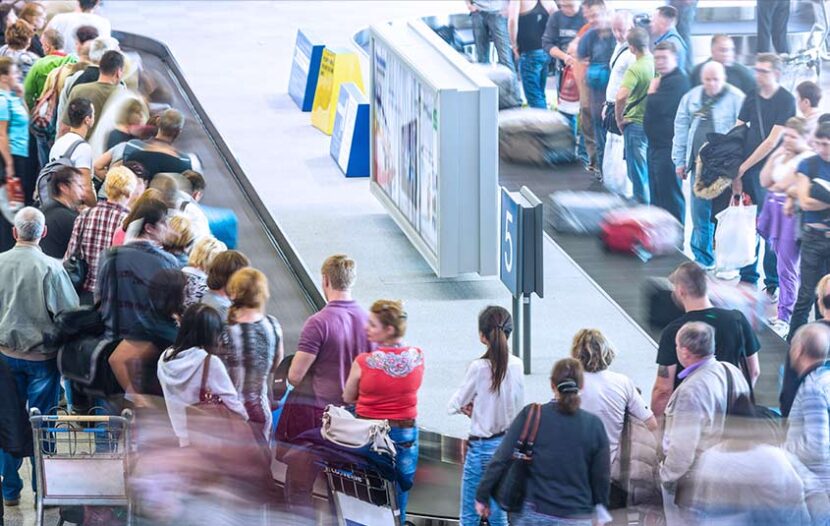After a series of nerve-fraying flight delays and cancellations, Jenn Bertschi made it to her grandmother’s funeral with minutes to spare.
Landing at Toronto’s Pearson airport from Calgary late Friday night, she was told the 12:30 a.m. connecting flight to Ottawa for her and her toddler and infant had been cancelled, with a rebooking at 10:30 Saturday morning.
Bertschi, 31, had gate-checked her stroller in order to retrieve it the moment she stepped off the plane, but was informed instead it would show up in baggage claim before being directed instead to customer service.
“So we trek it up to the third floor. They told us, ‘No, we can’t do anything about it. You have to go downstairs.”’
She was told the same thing downstairs, and the process repeated itself, as Bertschi hauled a large carry-on bag and an eight-month-old, she said in a phone interview.
At 4 a.m. she asked an Air Canada manager to help her get her family and luggage to security and ultimately the gate.
“He just kind of stared at me and was like, ‘Well, I don’t know what to do because we don’t have strollers,”’ Bertschi recalled, describing Air Canada staff as “unhelpful and not empathetic.”
“My toddler is overtired and running around and I’m trying to chase him,” she said. “I was crying because I’m so overwhelmed.”
The elusive stroller, which didn’t leave Calgary with her departing flight, had arrived in Ottawa by the time she landed there at around noon Saturday. But her luggage hadn’t made it past Toronto. Bertschi rushed to a store to buy an outfit for her grandmother’s funeral.
“It was very, very close,” she said. “I will not fly Air Canada ever again. And I don’t think I’ll fly into Toronto.”
Air Canada said it understands the “disappointment and inconvenience” of disrupted travel, noting that severe storms derailed operations in Central Canada on Friday night.
“We are currently reviewing her case and we will be following up with the customer directly,” spokesman Peter Fitzpatrick said in an email.
Travellers, experts and now Canada’s transport minister are casting an increasingly wary eye on airlines’ role in the travel turbulence playing out at airports across the country, with many calling for carriers to take more ownership of the issue.
The federal government has been scrambling to respond to scenes of endless lines, flight delays and daily turmoil at airports _ particularly at Pearson _ a problem the aviation industry has blamed on a shortage of federal security and customs officers at the Canadian Air Transport Security Authority (CATSA) and Canada Border Services Agency (CBSA) respectively.
“Airlines have a duty as well. We’re hearing some stories about luggage issues and flights cancelling,” Transport Minister Omar Alghabra told reporters Tuesday in Ottawa.
“We’re making sure that the airlines keep up their end of the bargain.”
The National Airlines Council of Canada which represents airlines says they’ve already done that.
“The delays at Canada’s airports are not due to staffing at levels at airlines, but rather due to the workforce challenges at NAV Canada (which runs the country’s air navigation service), CATSA and CBSA which have a cascading effect on flight schedules and resources across the ecosystem,” Suzanne Acton-Gervais said in an email.
John Gradek, head of McGill University’s aviation management program, says airlines have used Ottawa as a “scapegoat” while scheduling more flights than they have staff or planes to provide, resulting in delays and cancellations.
“The airlines basically have shot themselves in the foot by really throwing a lot more capacity at the world than they have resources to be able to handle,” he said.
“They’re being very aggressive in the marketplace, getting lots of traffic _ airplanes are often at 90 per cent load factor _ and don’t have any idle assets hanging around just in case things go wrong. And then that’s a formula for disaster when things do start to go wrong.”
Passengers say they receive last-minute emails informing them of repeated delays, aircraft changes or rebookings scheduled days after the original departure time. Reasons cited run the gamut from absent pilots and occupied baggage handlers to unplanned mechanical maintenance.
Kinks in one part of the air travel pipeline can snarl others, with overflowing customs areas stopping flight crews from disembarking, for example, or a lack of airline customer service agents exacerbating delays.
The federal airport security authority has hired more than 900 screeners since April, though many remain in training, Alghabra said. Ottawa has also suspended randomized COVID-19 testing of vaccinated passengers through at least June 30, following sector demands to process international travellers more quickly.
Not all industry watchers agree with the transport minister’s take on more than two months of travel turbulence.
“Airlines do have to take responsibility, particularly for taking care of their customers. But he’s being disingenuous in trying to shift blame,” said former Air Canada chief operating officer Duncan Dee.
“No airline anywhere on the planet can staff themselves or procure enough spare aircraft to make up for what is amounting to almost 90 days of delays caused by government service failures in Canada so far.”
Flights held on the tarmac because of bulging customs halls can leave crew out of “duty time” _ the regulatory and contractual limits on hours worked _ prompting personnel gaps. Meanwhile a flight missed due to a long security queue or delayed connecting flight may take hours to rebook, since agents slated to cover the customer service counter are still working to board passengers on a different delayed plane. Similar snags confront baggage handlers.
“It becomes very, very blurred,” Dee said.
Air Canada said it continues to hire, with 32,000 employees now on its payroll — nearing 2019 staffing levels — “and we are prudently operating 80 per cent of our 2019 summer schedule,” Fitzpatrick said.

